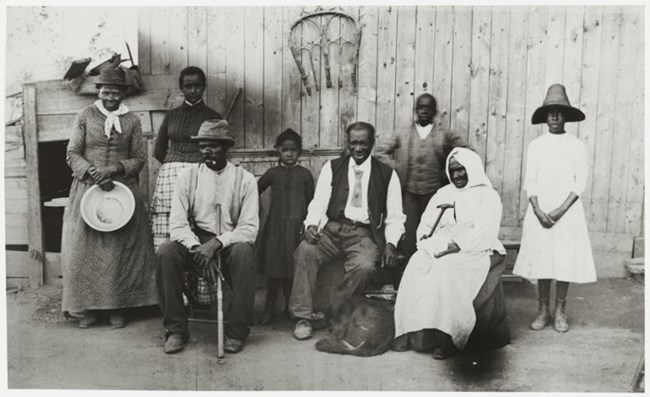Why Did You Some Slaves Risked Their Lives and Freedom Again to Help Free Others
"When I found I had crossed that line, I looked at my hands to see if I was the same person. At that place was such a glory over everything; the sunday came similar gold through the copse, and over the fields, and I felt like I was in Heaven." Harriet Tubman

Schomburg Eye for Research in Black Culture, Photographs and Prints Division, The New York Public Library.
In 1849 Harriet Tubman learned that she and her brothers Ben and Henry were to be sold. Financial difficulties of slave owners frequently precipitated sale of slaves and other holding. The family had been broken earlier; three of Tubman'south older sisters, Mariah Ritty, Linah, and Soph, were sold to the Deep South and lost forever to the family and to history.
Determining their own fate, Tubman and her brothers escaped, but turned dorsum when her brothers, one of them a brand-new father, had second thoughts. A short time afterward, Tubman escaped solitary and fabricated her style through Maryland, Delaware, and across the line into Pennsylvania and freedom. Tubman's biographer, Sarah Bradford, quoted Tubman recalling, "When I found I had crossed that line, I looked at my hands to see if I was the same person. There was such a celebrity over everything; the lord's day came similar golden through the copse, and over the fields, and I felt like I was in Heaven."
Tubman came from a strong customs with regular connections to other places through the travelers and workers who passed through on its roads and waterways. Her father and others taught her skills about the natural world and she developed savvy that helped her navigate beyond landscapes and through life. Her bravery may be attributed to these skills, just about of all, Tubman had a lifelong, fierce, and unwavering faith in God. Abolitionist Thomas Garrett said of her, "I never met with whatever person of whatsoever colour who had more confidence in the voice of God, as spoken direct to her soul."
Despite additional dangers resulting from the Fugitive Slave Human activity of 1850, Tubman risked her life and ventured back to the community where she was born to rescue family, friends, and others. The act required the reporting and arrest of anyone suspected of being a runaway slave, eliminated protections for suspected runaways, and provided economic incentives to kidnap people of African descent.
Tubman returned to Maryland'due south Eastern Shore to rescue members of her family; her brothers, Henry, Ben, Robert, and Moses, their wives, and several of her nieces and nephews and their children. Tubman's husband, John Tubman, a gratuitous African human, had married once again after Tubman outset left Maryland and declined to become north when she came to get him. The decision to cocky-emancipate was a difficult ane with complicated considerations near family ties, children, how to make a living, and how to navigate the unknown.
Tubman rescued her elderly parents in summer 1857 when her begetter, Ben Ross, was warned that he would exist arrested for suspicion of sheltering the Dover Eight, a group of 8 freedom seekers from her home county in Maryland. Ross had been manumitted, or freed, past this possessor'due south will in 1840 and he had purchased his wife, Harriet "Rit" Green's freedom in 1855. Freedom was ever tenuous and the threat of imprisonment made them leave Maryland.
Over about a decade and in about thirteen separate trips, Tubman led approximately seventy people to freedom and provided instructions to 50-60 others to help them escape. Abolitionist William Lloyd Garrison called her "Moses" for her work leading people from slavery. She was proud of her accomplishments and in 1896 spoke at a women's suffrage convention, "I was the conductor of the Underground Railroad for 8 years, and I can say what most conductors can't say — I never ran my railroad train off the rails and I never lost a rider."
Freedom was bloodshot for Harriet Tubman. Despite the separations imposed past slavery, Tubman came from a shut family unit in a tight community and she missed them. She believed they should be gratis, too. She said, "I was a stranger in a foreign land; and my abode, later on all, was down in Maryland, considering my male parent, my mother, my brothers, and sisters, and friends were there. Merely I was free, and they should be free."
Source: https://www.nps.gov/articles/harriet-tubman-and-the-underground-railroad.htm
0 Response to "Why Did You Some Slaves Risked Their Lives and Freedom Again to Help Free Others"
Post a Comment